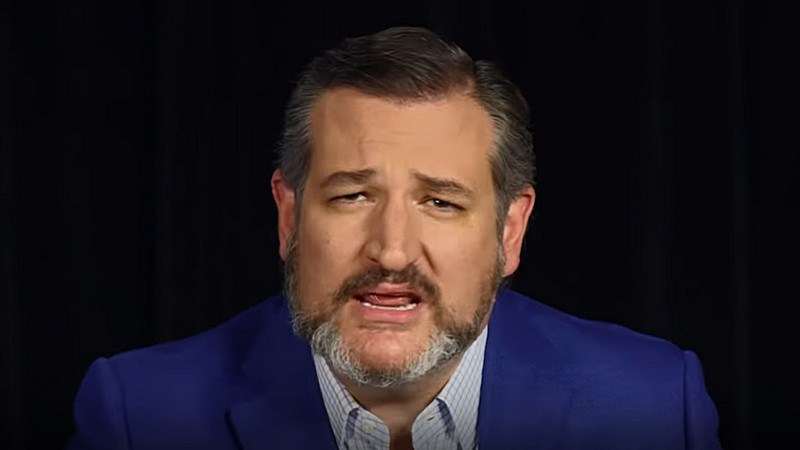Sen. Ted Cruz’s new book about the Supreme Court reads like an homage to his own brilliance and the first campaign material for a 2024 run for the presidency, which Cruz admits he is still interested in pursuing. “One Vote Away: How a Single Supreme Court Seat Can Change History,” released by right-wing publisher Regnery at the end of September, unintentionally makes clear just how disastrous a President Cruz would be.
Cruz’s book was written before the death of Justice Ruth Bader Ginsburg but published just afterward, as Republicans rushed to fill the seat during a pandemic and with an election under way. The book begins with the senator from Texas recounting that immediately after hearing of the death of Justice Antonin Scalia, he was the first to demand that the seat be held open for the next president. “President Obama of course, would try to rush through a replacement in the waning months of his presidency,” writes Cruz, who is now helping Trump push through Amy Coney Barrett’s nomination in the waning days of his presidency.
Cruz says the Supreme Court vacancy created by Senate Republicans’ refusal to consider Obama’s nomination of Merrick Garland was for many Americans, including Cruz himself, “the single most important reason we voted for Donald Trump over Hillary Clinton.”
And yet, while Trump’s packing of the federal courts with unqualified ideologues and his nominating Supreme Court justices pre-approved by the right-wing Federalist Society have won cheers from most conservatives, Cruz looks a bit askance at Justices Neil Gorsuch and Brett Kavanaugh, saying they had not proven themselves sufficiently committed to ideological combat on behalf of a far-right vision of the Constitution. (Cruz also makes it clear that he is no fan of Chief Justice John Roberts, who he dubs “the new Sandra Day O’Connor.”)
Before Gorsuch and Kavanaugh’s nominations were announced, Cruz says he lobbied Trump to name Sen. Mike Lee of Utah to the Supreme Court. Lee has been ranked the most right-wing member of the Senate and espouses a radical Tea Partier’s view of the Constitution. When Cruz floated Lee as a potential justice during his presidential campaign in 2016, Right Wing Watch noted that Lee has “perhaps the most extreme view of the Constitution of anyone in the Senate.”
Notably, when Cruz had the opportunity to grill Amy Coney Barrett on her judicial philosophy during her confirmation hearing last week, he instead asked her about her children’s piano lessons and distance learning. Clearly, Cruz is already convinced that Barrett fits the mold of the reliably right-wing ideological combatant he says conservatives must demand.
In the book, Cruz writes that Trump asked him if he was interested in becoming a Supreme Court justice, but Cruz decided that he’s more interested in pursuing right-wing policy goals as a politician—and future presidential candidate. His analysis of the 2016 Republican primary is that he would have been victorious if not for the mainstream media’s fixation on Trump.
The bulk of the book is a series of topic chapters covering issues of concern to the right-wing activists Cruz is courting, including religious liberty, “school choice,” gun control, national sovereignty, abortion, Citizens United, and “law and order.” In each chapter, Cruz proudly describes his leadership and strategic genius as he recounts Supreme Court cases in which he was involved as solicitor general of Texas and organizer of amicus briefs. Those sections are generally followed by a policy discussion accusing Democrats of embracing dangerously radical positions on the issue and warning that disaster is just a liberal Supreme Court justice away.
Cruz also includes a chapter on his role in the notorious Bush v. Gore decision, which he unironically categorizes as “democracy.” He defends Republicans’ behavior in that case based on their belief that in any recounts, Republicans would be scrupulously honest and Democrats would inevitably try to cheat their way to victory.
Cruz dedicated “One Vote Away” to former Chief Justice William Rehnquist, for whom he clerked. He calls the “deeply conservative” Rehnquist “one of the greatest justices ever to serve on the Court” and praises him for moving the court to the right.
Rehnquist was a law clerk for Justice Robert Jackson when the Supreme Court was considering Brown v. Board of Education; in 1951, Rehnquist wrote Jackson a memo defending separate-but-equal policies and arguing that Plessy v. Ferguson, which upheld segregation, “was right and should be affirmed.” Rehnquist later claimed that he was reflecting Jackson’s views and not his own, but scholars have questioned the credibility of Rehnquist’s claims.
Before joining the court, Rehnquist was a political operative who took part in a 1962 Republican campaign in Phoenix, Arizona, that “was designed to reduce the number of Black and Hispanic voters by confrontation and intimidation,” in the words of a former federal prosecutor. When Rehnquist denied those charges during his 1986 confirmation hearings, his testimony was disputed by multiple witnesses.
Given that Cruz calls Rehnquist “one of the greatest justices ever to serve on the court,” you can imagine what a Supreme Court might look like under a President Cruz. Even more telling is the scenario Cruz plays out in a section of the book criticizing Republican presidents’ record of nominating justices who didn’t turn out to be reliably right-wing. Cruz fantasizes about the way things might have been if Ronald Reagan nominee Robert Bork had been confirmed rather than rejected by the Senate and if the ultra-conservative Edith Jones had been nominated by President George H.W. Bush instead of David Souter:
If those two things had both happened, we would have had a five-justice majority of which Antonin Scalia would arguably have been the most liberal: a majority consisting of Chief Justice Rehnquist, Clarence Thomas, Robert Bork, Edith Jones, and Antonin Scalia, with Justice O’Connor floating out there as the possible sixth vote in any particular case. The annals of constitutional history for the last four decades would have been dramatically different.
Cruz of course wishes that he were in the White House rather than Trump. But given Trump’s record of appointing more extreme judges than either Reagan or Bush, a second Trump term could well give Cruz the Supreme Court of his dreams.









